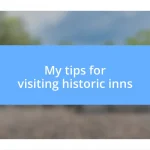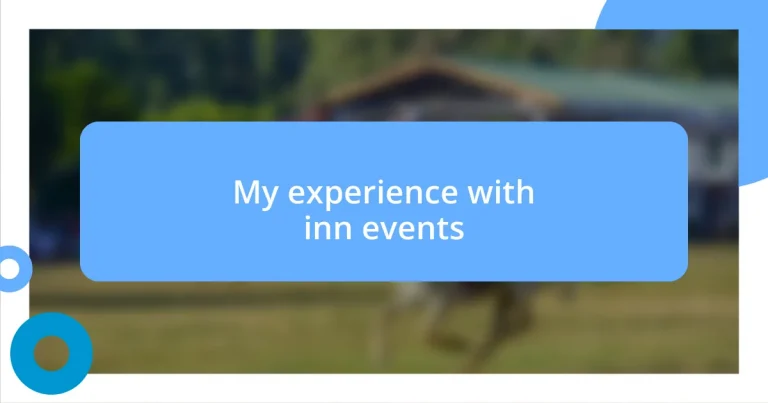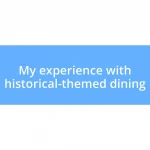Key takeaways:
- Inn events create intimate and memorable experiences, fostering connections and community among guests through shared meals and storytelling.
- Planning an inn event involves careful attention to detail, including a well-thought-out guest list and a thematic focus on seasonal or regional ingredients.
- Engaging guests through interactive elements, music, and personalized touches enhances participation and creates lasting memories.
- Evaluating event success combines emotional feedback, quantitative data, and post-event follow-ups to assess connections made and overall impact.
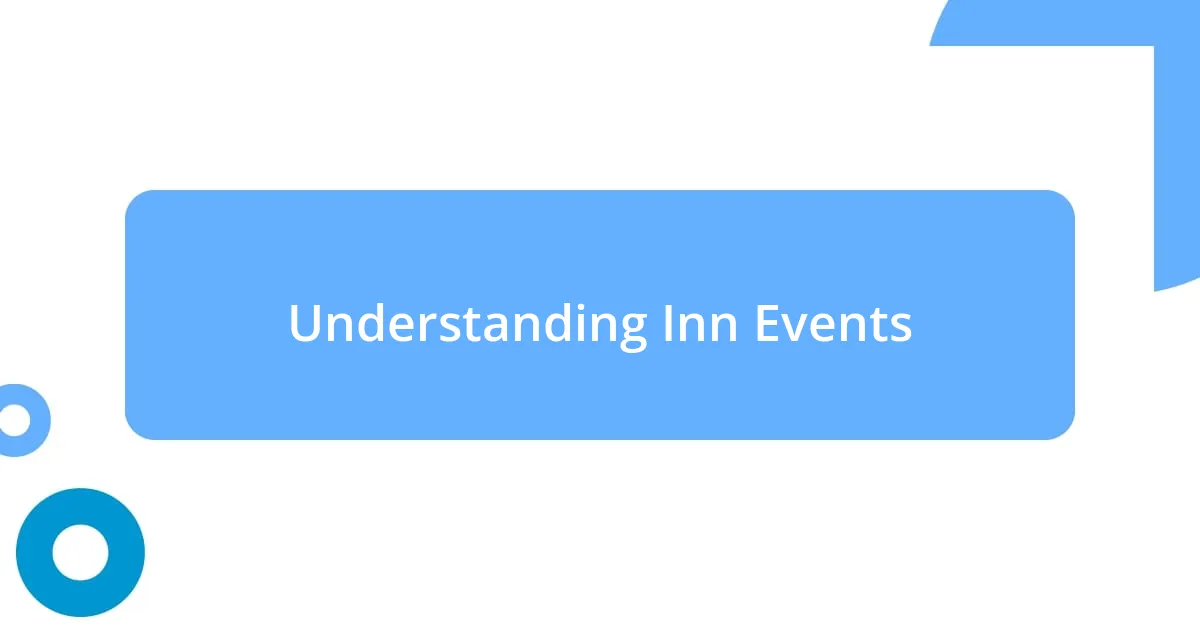
Understanding Inn Events
Inn events are unique gatherings that blend hospitality with experiential warmth, creating memorable moments for both hosts and guests. I remember the first time I attended an inn event; the atmosphere was intimate, accompanied by the scent of freshly baked bread wafting through the air. It made me wonder how a simple gathering could evoke such a sense of belonging and community.
The beauty of inn events lies in their ability to connect people in a cozy, inviting environment. Have you ever found yourself laughing unexpectedly with strangers over a shared meal? It’s delightful how these gatherings facilitate organic conversations, often leading to lasting friendships. I’ve experienced those moments firsthand, where I walked away from an event not just with a full belly, but with new connections that added vibrancy to my social circle.
As I think back on my experiences, I realize that inn events also allow hosts to showcase their personalities and the essence of their space. Each event reveals unique stories and local flavors, inviting attendees to step into a new world, even if just for an evening. How often do we get to explore new cultures or traditions without traveling far? I truly cherish those evenings when the simple act of gathering becomes a celebration of life’s little joys.
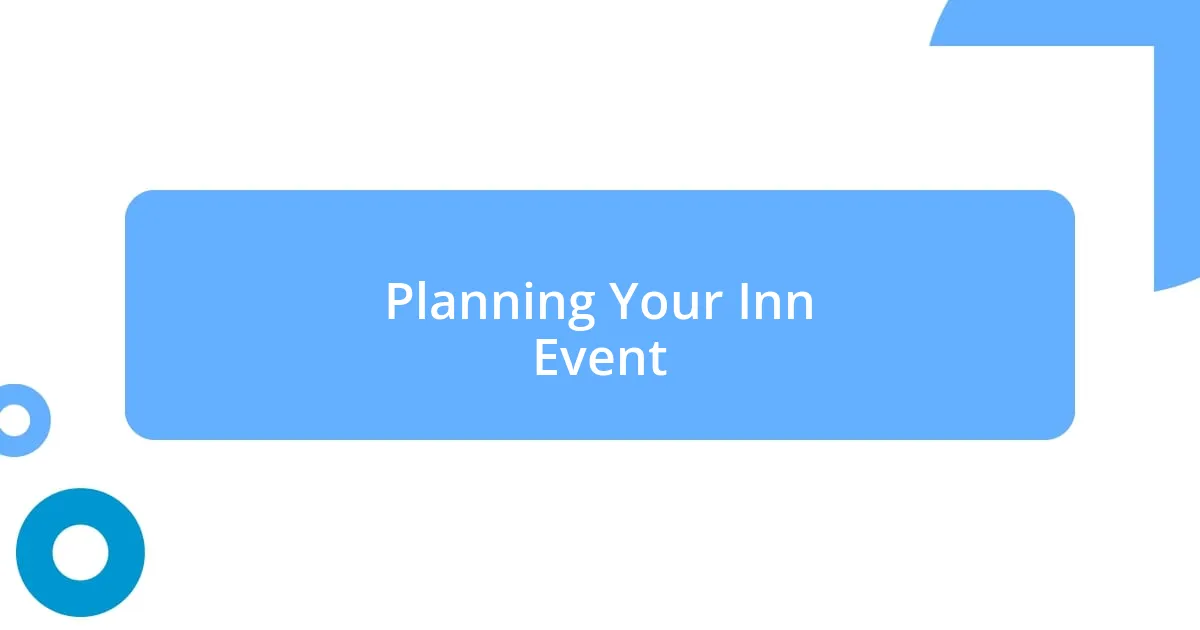
Planning Your Inn Event
Planning an inn event requires attention to detail and a touch of creativity. I once arranged a small gathering at a quaint inn where I chose a theme centered around seasonal ingredients. By doing this, I transformed a simple dinner into a culinary adventure that resonated with everyone. Guests weren’t just enjoying a meal; they were participating in an experience that was both educational and delicious.
When it comes to logistics, I can’t stress enough the importance of a well-thought-out guest list. In my own experience, crafting the right mix of personalities can elevate the atmosphere dramatically. For instance, pairing a local artist with passionate foodies sparked incredible discussions and unexpected collaborations. After all, it’s fascinating how the right combination of guests can turn an ordinary evening into an extraordinary one.
As you plan your event, consider crafting a narrative that goes beyond just food and drink. I remember hosting an event where we shared personal stories related to our favorite dishes. It brought everyone closer together, creating an engaging and warm atmosphere. By weaving storytelling into your event, you enrich the experience for your guests, turning it into something they’ll remember fondly for years to come.
| Aspect | Details |
|---|---|
| Theme Selection | Focus on seasonal ingredients or regional specialties to create a memorable culinary experience. |
| Guest List Composition | Mix diverse personalities to spark engaging conversations and connections among guests. |
| Experience Enrichment | Incorporate storytelling to deepen the connection between guests and the food served, enhancing the overall atmosphere. |
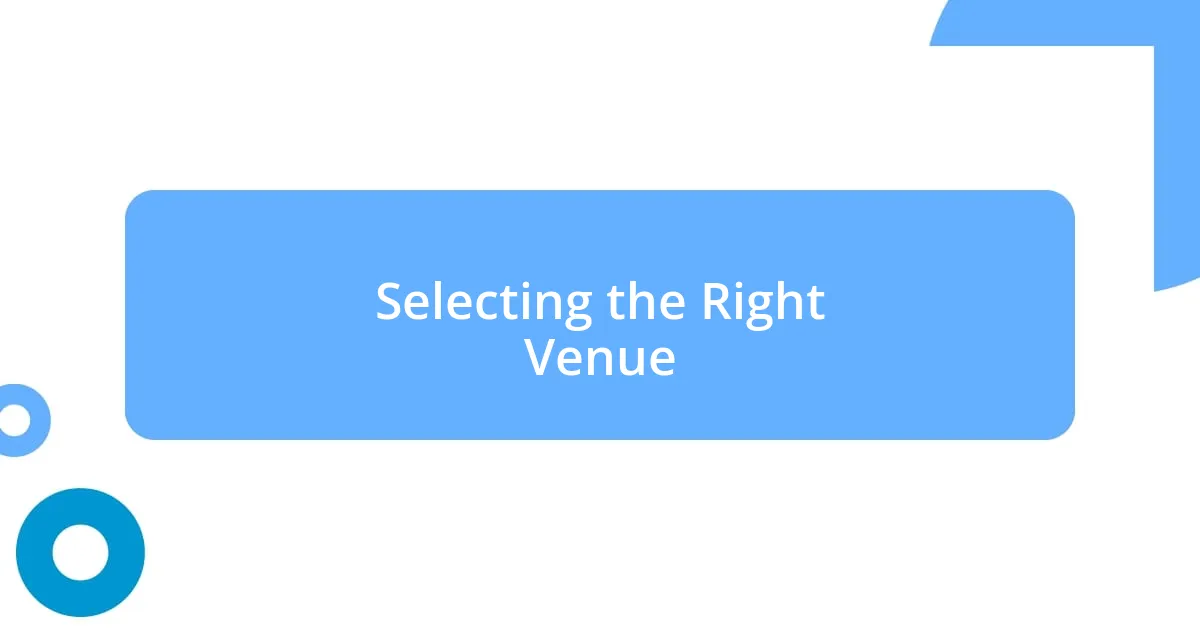
Selecting the Right Venue
Selecting the right venue can truly set the tone for an inn event. Reflecting on my own experiences, I’ve learned that the atmosphere of the space can transform the gathering completely. Once, I chose a historic inn with low, beamed ceilings and warm, flickering candlelight. The venue itself became a character in the evening, inviting guests to share stories and connect in a place steeped in charm and history.
When considering a venue, here are some key aspects to keep in mind:
- Capacity: Ensure the space comfortably accommodates your guest list without feeling cramped or too empty.
- Ambiance: Look for a venue that resonates with the theme of your event, whether it’s rustic charm or modern sophistication.
- Accessibility: Consider the location’s convenience for attendees; easy access goes a long way in encouraging participation.
- Facilities: Check if the venue has necessary amenities like audio-visual equipment or catering options to suit your needs.
- Outdoor Options: If the weather permits, venues with outdoor spaces can add a delightful dimension to your event.
Each venue has its own unique elements that can elevate the experience. I fondly remember a gathering held in a garden space filled with blooming flowers and the gentle sound of a nearby stream. It created an idyllic backdrop that made the conversations flow naturally, as if the surroundings themselves were encouraging us to relax and enjoy each other’s company.
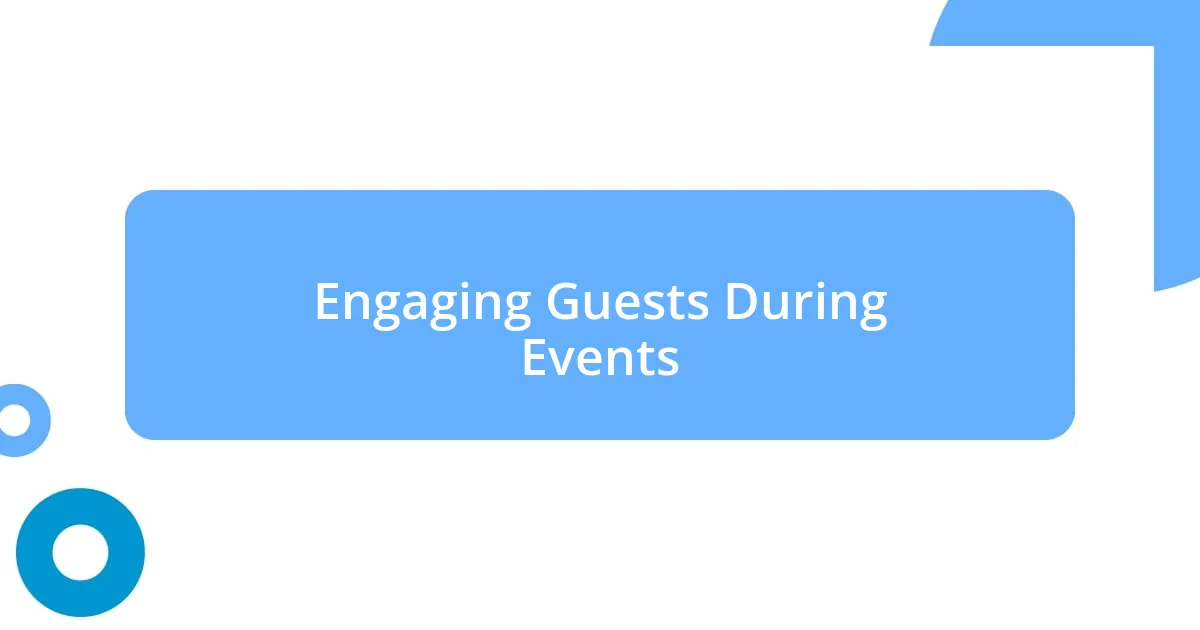
Engaging Guests During Events
Engaging guests during an event goes beyond just serving food and drinks; it’s about creating connections. I recall a night when I set up a fun “mini talent show” at a gathering. Guests were encouraged to showcase their hidden talents, and the laughter and joyful surprises that emerged changed the atmosphere completely. It was such a delightful way to break the ice. Isn’t it amazing how a little creativity can bring people together?
To ensure everyone feels involved, I often incorporate interactive elements—like DIY stations or gamified experiences. One time, I created a build-your-own cocktail station, complete with unusual mixers and garnishes. Guests loved experimenting and sharing their concoctions. When everyone actively participates, the energy in the room transforms, don’t you think?
Music is another vital tool for engagement. I once hosted a dinner with a live band playing soft acoustic tunes. It not only set a lovely vibe, but it also inspired spontaneous sing-alongs and dancing. There’s something about live music that connects people on a deeper level, creating those unforgettable moments that keep everyone talking long after the event is over. What experiences have you had with music at events?
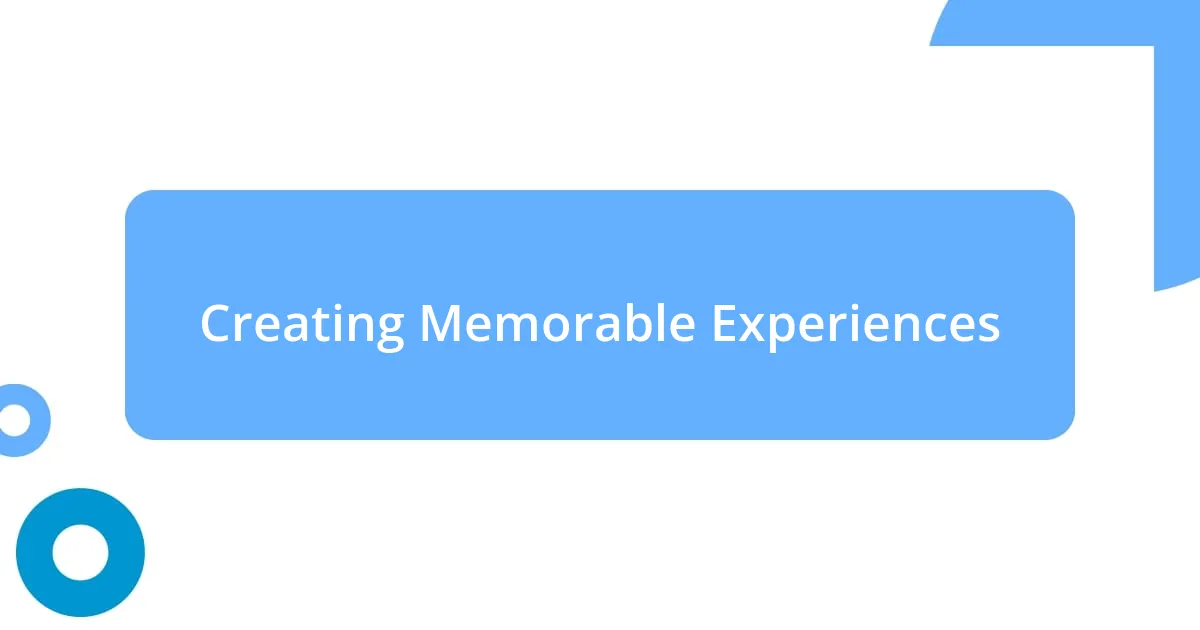
Creating Memorable Experiences
Creating memorable experiences often hinges on unique and thoughtful details. I remember one cozy evening where we decided to incorporate personalized place cards for each guest, complete with a small note on why they were special to us. It was heartwarming to witness the smiles and laughter as people read their cards, sparking conversations about shared memories. Doesn’t it make you feel good when someone recognizes your significance in their life?
Another key aspect is incorporating meaningful traditions or activities. At a recent gathering, we made it a point to share a toast that honored both new friendships and old connections. Each guest recounted a cherished memory, and it fostered such a warm and inclusive environment. It’s incredible how these shared stories draw everyone closer; have you ever felt that connection over shared experiences?
Lastly, I find that the little touches, like scent and lighting, can elevate the atmosphere to new heights. One of my favorite moments was when a subtle fragrance of fresh lavender wafted through the air, complemented by twinkling fairy lights draped around the space. Guests remarked on how those elements made the evening feel enchanting and intimate. Isn’t it fascinating how our senses can shape our memories? When we intentionally create an environment that appeals to different senses, the event transforms into a lasting experience in everyone’s hearts.
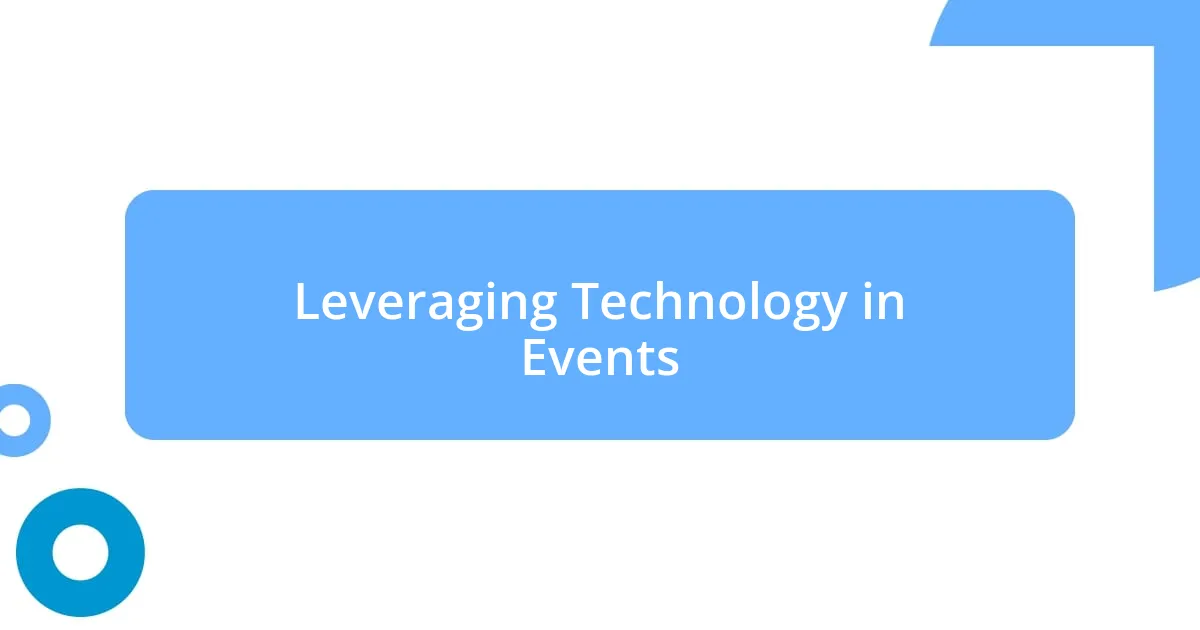
Leveraging Technology in Events
Leveraging technology in events can truly elevate the experience for both hosts and guests. I vividly recall a corporate workshop where we integrated a live polling app. Attendees could submit questions and vote on topics in real-time, which not only engaged them but ensured that the discussion stayed relevant. Isn’t it exciting how technology can bridge the gap between speakers and participants?
Additionally, using event management software has made organizing logistics feel seamless. I once coordinated an outdoor festival and utilized an all-in-one app for ticketing, scheduling, and attendee communication. Watching the attendees enjoy the festival with minimal hassle made me realize how efficient technology can revolutionize the event experience. Have you ever experienced a smoother event flow thanks to tech tools?
Virtual reality is another game-changer that I’ve explored in my events. At a product launch, I set up VR stations where guests could immerse themselves in the features of our product. The reactions were priceless—people laughed and gasped, and I could see the genuine excitement on their faces. Technology not only facilitates engagement but also creates memorable, shareable moments that keep attendees talking. How can you envision incorporating VR into your next gathering?
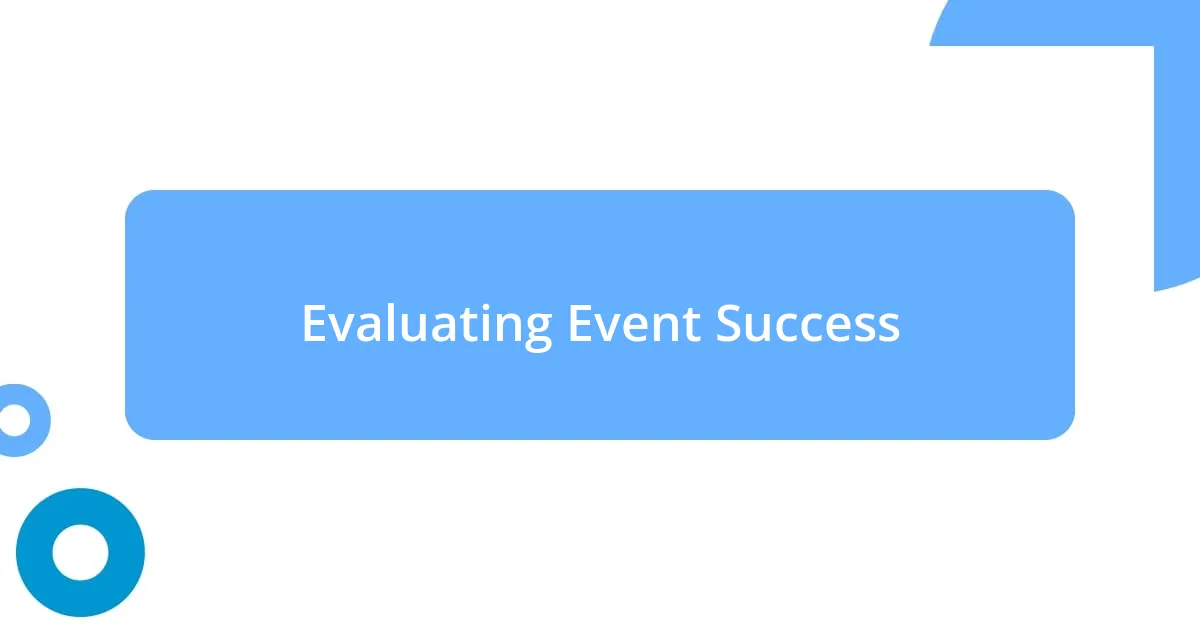
Evaluating Event Success
Evaluating the success of an event often comes down to measuring the emotions and memories it creates. I recall one intimate dinner party where, after the event, I received heartfelt messages from guests about how appreciated they felt. Isn’t it rewarding when people take the time to express gratitude? That genuine feedback made me realize that success isn’t just about the logistical aspects but also about the meaningful connections formed.
Another important factor involves gathering concrete data. For instance, after hosting a charity event, I distributed surveys to capture attendees’ thoughts on various elements, from the venue to the entertainment. When I saw that 90% of respondents left feeling inspired about our cause, I knew we had hit the mark. It makes me think—how can we combine qualitative feelings with quantitative data to get a complete picture of an event’s success?
Additionally, post-event follow-ups can provide invaluable insights. I often send a thank-you email that includes a recap of the night, along with testimonials and photos. During these follow-ups, I’ve encountered stories that revealed how a simple conversation led to new collaborations. How amazing is it that an event can spark connections that last long after the lights go down? By keeping those lines of communication open, the event’s impact can extend well beyond its duration.





